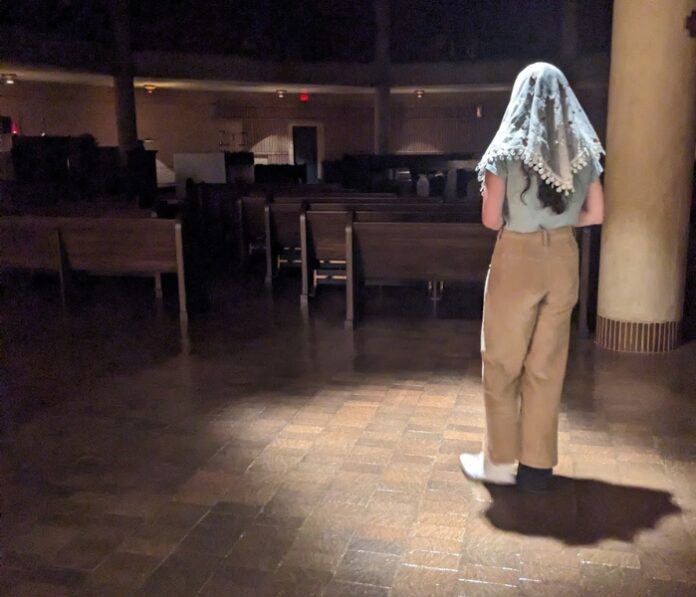
A reflection on interior and exterior reverence
Disclaimer: All articles published under this section are the opinions of the respective authors and do not necessarily reflect the opinions of The Cor Chronicle
One of my favorite things about the Church of the Incarnation is the respect and reverence of the people who worship there. Their love of Christ and fear of the Lord is always impressive to me.
At my high school, if you were to stop by the chapel to say a quick prayer or to spend time in silence with the Lord, you were almost guaranteed that it would just be you and Jesus. Here, I find myself a little disappointed that at any time of day or night, I am never the only one in the church! This is the kind of problem the chaplain at my high school would have loved to have.
The community of the University of Dallas also has a special respect for Christ in the Eucharist. Students and other members of the community revere the Eucharist at Mass, in Adoration and even when just passing by the chapel.
In Mass, this is especially evident. People’s silence, participation in singing and attention in keeping the church a place of worship is obvious.
Because I love the UD Catholic community, I wanted to offer a few reflections on Communion, which is the source and summit of our Catholic lives.
The USCCB says, “All our lives we who believe in Christ are moving in time toward that moment when we will be taken by death from this world and enter into the joy of the Lord in the eternal Kingdom he has prepared for us. The liturgical assembly of the baptized that comes together for the celebration of the Eucharist is a witness to, a manifestation of, the pilgrim Church.”
“When we move in procession, particularly the procession to receive the Body and Blood of Christ in Communion, we are a sign, a symbol of that pilgrim Church ‘on the way.’”
I find this idea to be particularly moving.It reminds me of the importance of signs, symbols, and actions in the liturgy, particularly in the reception of Communion.
I particularly wanted to share a few thoughts and theological reflections on the reception of Communion in the hand. I feel reception of Communion in the hand often has an unsavory reputation, since it is sometimes the preferred method of Communion by people who may not be the best examples of Catholics in the Church.
The common reason given by people who receive in the hand is, “My family has always done it this way.” While that may be the only reason some people do it, I want to offer an alternative reason.
To me, receiving the Eucharist in my own hands is very powerful, and I should feel deeply the greatness of it. Bowing or genuflecting before Communion is the recognition that the King of the Universe is right there in front of me and wants me to live in Him. When I stand face-to-face with Him, as it were, I am reminded that Jesus also was a human and stood like us.
Standing also signifies to me that following Christ is an action: we are supposed to “go, make disciples of all nations,” as it says in the Gospel of Matthew. Receiving His Body in my hands is such a gift: Jesus said “This is My Body, take and eat.” I know that historical accuracy is not the goal of how we receive the Eucharist, but I do feel closer to the Apostles when I eat as they might have eaten.
I write these reflections as a way to emphasize that there is more than one way to be reverent and, hopefully, that we can all be more reverent, whether Lauren Daigle’s praise and worship or Gregorian chant is more our jam.
I think it is important to recognize that reverence is both an outer and inner attitude. It is possible to look reverent but be thinking of other things. We all know this from our own experience.
Because of this division between the interior and exterior, we cannot judge other people’s inner attitudes solely by their outer actions. Our irresponsible judgment of others can get in the way of our love for them, and loving them is our goal as followers of Christ.
We need to refine our inner reverence, which is already so great at UD, and match that inner reverence with our outward actions. It is important to contemplate these words from the Catechism of the Catholic Church: “Before so great a sacrament, the faithful can only echo humbly and with ardent faith the words of the centurion: ‘Lord, I am not worthy for you to enter under my roof, but only say the word and my soul shall be healed.’”
Bio: Rue Burkett is a freshman and a lector at the Church of the Incarnation.
